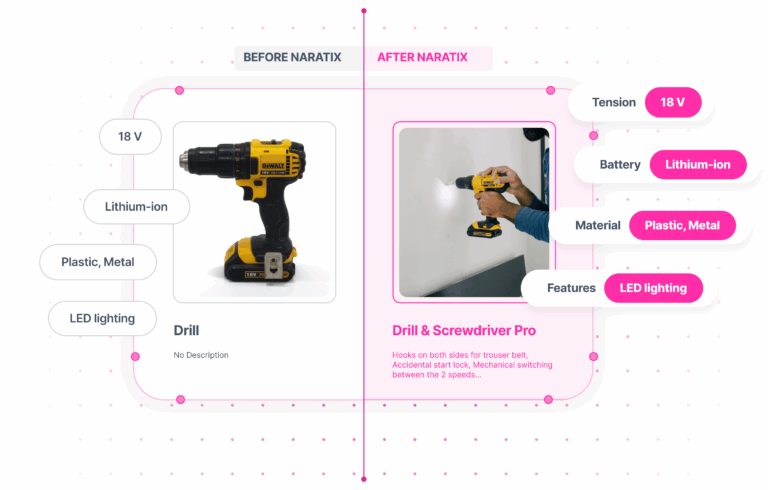Automate DIY catalog cleanup and enrichment
Complete every dimension, weight, and packaging spec so pricing, shipping, and compliance flow smoothly

What is DIY catalog intelligence and how does it work?
DIY catalog intelligence ingests supplier feeds, no matter how messy, fills missing EANs, dimensions, and packaging details, and flags stock or price shifts in real time. It transforms up to a million SKUs in mere hours, delivering a ready-to-integrate catalog without touching live listings.
DIY Catalog results
SKUs cleansed in 6 h
Average spec-completion rate
Drop in manual enrichment effort
Why DIY catalog intelligence powers better catalog performance
DIY catalog automation transforms messy supplier feeds into complete, structured data, filling specs, packaging, and dimensions so listings meet pricing, shipping, and compliance demands at scale.
Rapid catalog turnaround
Processes huge assortments and returns clean data overnight
Complete technical specs
Fills dimensions, materials, and weights so shipping and filters work
Accurate packaging data
Adds box size and units per pack for flawless logistics
Real-time price insights
Monitors cost and market shifts to protect margins
Reduced manual workload
Automation replaces spreadsheet cleanup and copy-paste tasks
Scales to million-SKU ranges
Handles expansion without hiring extra content staff
Ready to fix your DIY catalog in a single day?
Request a free sample cleanup and see the transformed data before you commit
Ecommerce automations by industry
DIY catalog intelligence ingests supplier feeds, no matter how messy, fills missing EANs, dimensions, and packaging details, and flags stock or price shifts in real time. It transforms up to a million SKUs in mere hours, delivering a ready-to-integrate catalog without touching live listings.
Fashion
Hardware & Electronics
General Marketplaces
Food & Beverages
Home & Deco
Industrial
Manufacturing
Automotive
Pharmaceutical
Beauty and Cosmetics
Sporting goods
DIY Catalog Intelligence
What data formats can we supply, and how complete do they need to be?
CSV, XLSX, XML, JSON, or API endpoints are all accepted, even if many fields are blank or inconsistent. The engine parses part numbers, partial EANs, supplier-specific codes, and free-text spec blocks, then normalises them against reference libraries for fast, reliable matching and enrichment.
How does the system infer dimensions or weights when suppliers don’t provide them?
It triangulates from similar SKUs already in the database, cross-checks manufacturer PDFs, and, when images are available, applies computer-vision rulers to estimate height, width, depth, and package volume. Each inferred value carries a confidence score and source trail so you can audit or override when needed.
Can it detect packaging variations like single units versus multi-packs?
Yes. Pattern recognition on product titles (“6 × 25 mm screws”), UoM fields, and barcode parity reveals pack relationships. The platform then links child variants to a parent SKU, assigning accurate case quantities and pallet counts for downstream logistics and shipping calculators.
How quickly will price and stock alerts reach my merchandising team?
Catalog intelligence jobs run hourly or on a custom cadence. When the engine spots a supplier price change, discontinued item, or low-stock alert, it pushes notifications to Slack, email, or your PIM dashboard within minutes, letting buyers adjust prices or substitutes before margins erode.
Does the cleanse touch live product pages or only generate a new file?
Only a new file. Your current listings stay online until you review and import the enriched data. If you use Akeneo, Salsify, or a custom PIM, ready-made connectors let you stage changes, run QA scripts, and publish in batches, keeping production stable.
How is long-term data quality maintained once the bulk cleanup is done?
A watchdog monitors new SKUs, supplier feed deltas, and market price files every night. Anything outside accepted ranges, missing EANs, rogue units, abnormal price jumps, flags for micro-enrichment. Monthly health reports track fill-rate, confidence trends, and rule drift so your DIY catalog stays robust all year.
DIY catalog intelligence
Pricing is based on the volume and complexity of your operations. Get a personalized quote tailored to your product catalog size, automation needs, and platform requirements